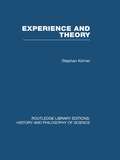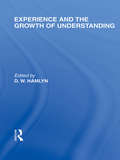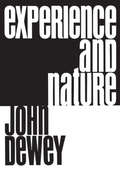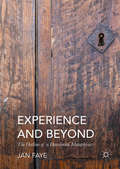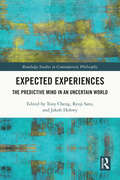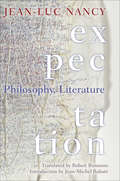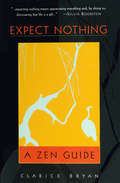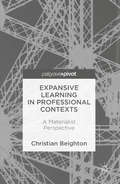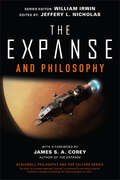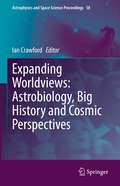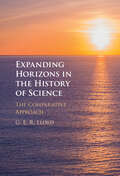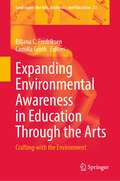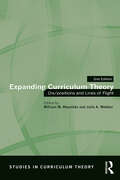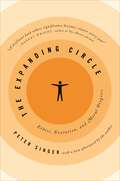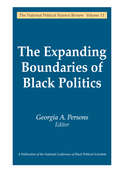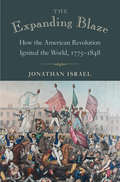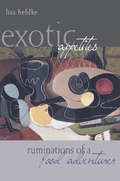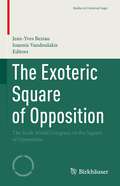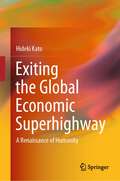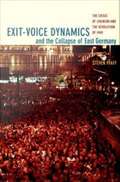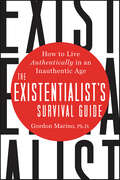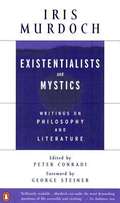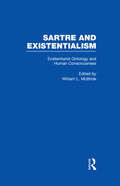- Table View
- List View
Experience and Theory: An Essay in the Philosophy of Science (Routledge Library Editions: History & Philosophy of Science)
by Stephan KornerOriginally published in 1966. This volume analyzes the general structure of scientific theories, their relation to experience and to non-scientific thought. Part One is concerned with the logic underlying empirical discourse before its subjection to the various constraints, imposed by the logico-mathematical framework of scientific theories upon their content. Part Two is devoted to an examination of this framework and, in particular, to showing that the deductive organization of a field of experience is by that very act a modification of empirical discourse and an idealization of its subject matter. Part Three analyzes the concordance between theories and experience and the relevance of science to moral and religious beliefs.
Experience and the growth of understanding (International Library of the Philosophy of Education Volume 11)
by D.W. HamlynThis volume examines some of the arguments that have been put forward over the years to explain the way in which understanding is acquired. The author looks firstly at the empricist thesis of genesis without structure, and secondly at the opposing theory, represented by Chomsky of structure without genesis. His greatest sympathy is with the theory of Piaget, who represents structure with genesis. He considers that Piaget's account is flawed, however, by its biological model and by its failure to deal adequately with the problem of objectivity. The second part of the book contains chapters on language, the differences between early and later learning, and on teaching. The book provides a general understanding of the principles that make it possible, and the differences between the ways in which they work at different stages.
Experience and Nature
by John DeweyThis is an enlarged, revised edition of the Paul Carus lecturers which John Dewey delivered in 1925. It covers Dewey's basic formulation of the problem of knowledge, with both a full discussion of theories and resolutions propounded by other systems, and a detailing of Dewey's own concepts upon the relationship of the external world, the minds, and knowledge.Starting with a thorough examination of philosophical method, Dewey examines the interrelationship of experience and nature, and upon the basis of empirical naturalism analyzes experience, the formulation of law, the role of language and social factors in knowledge, the nature of mind, and the final interrelation of mind and matter. Dewey, as in his other mature philosophy, attempts to replace the traditional separation of nature and experience with the idea of continuity, using the traditional separation of nature and experience with the idea of continuity, using the concept of language as the bridge.Dewey's treatment of central problems in philosophy and philosophy of science is profound, yet extremely easy to follow. His range of subject matter is very wide, from the anthropology of Malinowski to gravity, evolution, and the role of art, and his insights are clear and valuable. Scientists, philosophers of science, philosophers, and students of American history of thought will all find this one of the most profitable works by a great 20th-century thinker.
Experience and Beyond
by Jan FayeThis book presents a persuasive argument in favour of evolutionary naturalism and outlines what such a stance means for our capacity of observation and understanding reality. The author discusses how our capacity of knowledge is adapted to handle sensory information about the environment in the light of Charles Darwin's theory of evolution. The implication of this is that much of our thinking in science and philosophy that goes beyond our immediate experience rests on abstractions and hypostatization. This book rejects the possibility of having any knowledge of reality as it is in itself, while not denying that our capacity of conceptual abstractions is of great benefit for our survival.
Expected Experiences: The Predictive Mind in an Uncertain World (Routledge Studies in Contemporary Philosophy)
by Tony Cheng Ryoji Sato Jakob HohwyThis book brings together perspectives on predictive processing and expected experience. It features contributions from an interdisciplinary group of authors specializing in philosophy, psychology, cognitive science, and neuroscience. Predictive processing, or predictive coding, is the theory that the brain constantly minimizes the error of its predictions based on the sensory input it receives from the world. This process of prediction error minimization has numerous implications for different forms of conscious and perceptual experience. The chapters in this volume explore these implications and various phenomena related to them. The contributors tackle issues related to precision estimation, sensory prediction, probabilistic perception, and attention, as well as the role predictive processing plays in emotion, action, psychotic experience, anosognosia, and gut complex. Expected Experiences will be of interest to scholars and advanced students in philosophy, psychology, and cognitive science working on issues related to predictive processing and coding.
Expectation: Philosophy, Literature
by Jean-Michel Rabaté Jean-Luc Nancy Robert BononnoExpectation is a major volume of Jean-Luc Nancy’s writings on literature, written across three decades but, for the most part, previously unavailable in English. More substantial than literary criticism, these essays collectively negotiate literature’s relation to philosophy. Nancy pursues such questions as literature’s claims to truth, the status of narrative, the relation of poetry and prose, and the unity of a book or of a text, and he addresses a number of major European writers, including Dante, Sterne, Rousseau, Hölderlin, Proust, Joyce, and Blanchot. The final section offers a number of impressive pieces by Nancy that completely merge his concerns for philosophy and literature and philosophy-as-literature. These include a lengthy parody of Valéry’s “La Jeune Parque,” several original poems by Nancy, and a beautiful prose-poetic discourse on an installation by Italian artist Claudio Parmiggiani that incorporates the Faust theme. Opening with a substantial Introduction by Jean-Michel Rabaté that elaborates Nancy’s importance as a literary thinker, this book constitutes the most substantial statement to date by one of today’s leading philosophers on a discipline that has been central to his work across his career.
Expect Nothing
by Clarice BryanA inspiring & instructional guide to living out the powerful Zen tenet: by expecting nothing, we gain everything.
Expansive Learning in Professional Contexts
by Christian BeightonThis book discusses approaches to organizational learning from a materialist point of view. Inspired by research into Police Firearms training, features of expansive learning inform the development of perspectives on training which challenge traditional modes of research and delivery. The book critically reviews a range of approaches to expansive learning and organizational research, establishing the bases and limitations of an Expansive Learning Index whose aim is to support collaborative provision in the context of work-based research. Reflecting on this process, it stresses the strangeness and mobility of workplace learning and develops a philosophical pragmatics for professional development. Approaches to knowledge and enquiry which place language and subjectivity at the heart of development are challenged by a more pragmatic approach to expansive learning: its consequences for training, research, and professional development lead to a discussion of the need for immanent forms of professional ethics.
The Expanse and Philosophy: So Far Out Into the Darkness (The Blackwell Philosophy and Pop Culture Series)
by William IrwinEnter The Expanse to explore questions of the meaning of human life, the concept of justice, and the nature of humanity, featuring a foreword from author James S.A. Corey The Expanse and Philosophy investigates the philosophical universe of the critically acclaimed television show and Hugo Award-winning series of novels. Original essays by a diverse international panel of experts illuminate how essential philosophical concepts relate to the meticulously crafted world of The Expanse, engaging with topics such as transhumanism, belief, culture, environmental ethics, identity, colonialism, diaspora, racism, reality, and rhetoric. Conceiving a near-future solar system colonized by humanity, The Expanse provokes a multitude of moral, ethical, and philosophical queries: Are Martians, Outer Planets inhabitants, and Earthers different races? Is Marco Inaros a terrorist? Can people who look and sound different, like Earthers and Belters, ever peacefully co-exist? Should science be subject to moral rules? Who is sovereign in space? What is the relationship between human progress and aggression? The Expanse and Philosophy helps you answer these questions—and many more. Covers the first six novels in The Expanse series and five seasons of the television adaptation Addresses the philosophical issues that emerge from socio-economics and geopolitics of Earth, Mars, and the Outer Planets Alliance Offers fresh perspectives on the themes, characters, and storylines of The Expanse Explores the connections between The Expanse and thinkers such as Aristotle, Kant, Locke, Hannah Arendt, Wittgenstein, Descartes, and Nietzsche Part of the popular Blackwell Philosophy and Pop Culture series, The Expanse and Philosophy is a must-have companion for avid readers of James S.A. Corey’s novels and devotees of the television series alike.
Expanding Worldviews: Astrobiology, Big History and Cosmic Perspectives (Astrophysics and Space Science Proceedings #58)
by Ian CrawfordThis book collates papers presented at two international conferences (held at the Australian National University in 2018 and Birkbeck College London in 2019) exploring the relationships between big history and astrobiology and their wider implications for society. These two relatively new academic disciplines aim to integrate human history with the wider history of the universe and the search for life elsewhere. The book will show that, despite differences in emphasis, big history and astrobiology share much in common, especially their interdisciplinary approaches and the cosmic and evolutionary perspectives that they both engender.Specifically, the book addresses the unified, all-embracing, nature of knowledge, the impact of big history on humanity and the world at large, the possible impact of SETI on astrobiology and big history, the cultural signature of Earth’s inhabitants beyond our own planet, and the political implications of a planetary worldview. The principal readership is envisaged to comprise scholars working in the fields of astrobiology, big history and space exploration interested in forging interdisciplinary links between these diverse topics, together with educators, and a wider public, interested in the societal implications of the cosmic and evolutionary perspectives engendered by research in these fields.
Expanding the Palace of Torah: Orthodoxy and Feminism
by Tamar Ross"Expanding the Palace of Torah offers a broad philosophical overview of the challenges the women's revolution poses to Orthodox Judaism, and Orthodox Judiasm's response to those challenges. Writing as an insider (herself an Orthodox Jew), Ross seeks to develop a theological response that fully acknowledges the male bias of Judaism's sanctified texts, yet nevertheless provides a rational for transforming that bias in today's world without undermining their authority. She proposes an approach to divine revelation-- the theological heart of traditional Judaism-- which she calls "cumulativism." This approach is based on a conflating of strict boundaries between text and its interpretation, or the divine intent and the evolution of human understanding." "Ross believes that the greater fluidity afforded by cumulativism is necessary for legitimizing the insights of feminism and fully absorbing women's changed status within the religious rubric of Jewish tradition. Emphasizing that continuity with tradition can be maintained only when the halakhic system is understood as a living organism that grows via affirmation of its historical legacy and respect for its constraints, her book shows that the feminist revolution in Orthodox Judaism reaches beyond its practical effect upon individual lives to teach us something more profound about the nature of religious practice in general." -- Amy Gottlieb Zorn berg (from the back cover)
Expanding Horizons in the History of Science: The Comparative Approach
by G. E. LloydThis book challenges the common assumption that the predominant focus of the history of science should be the achievements of Western scientists since the so-called Scientific Revolution. The conceptual frameworks within which the members of earlier societies and of modern indigenous groups worked admittedly pose severe problems for our understanding. But rather than dismiss them on the grounds that they are incommensurable with our own and to that extent unintelligible, we should see them as offering opportunities for us to revise many of our own preconceptions. We should accept that the realities to be accounted for are multi-dimensional and that all such accounts are to some extent value-laden. In the process insights from current anthropology and the study of ancient Greece and China especially are brought to bear to suggest how the remit of the history of science can be expanded to achieve a cross-cultural perspective on the problems.
Expanding Environmental Awareness in Education Through the Arts: Crafting-with the Environment (Landscapes: the Arts, Aesthetics, and Education #33)
by Biljana C. Fredriksen Camilla GrothThis book presents diverse processes of crafting that bring humans, more-than-humans and the environment closer to one another and, by doing so, addresses personal and educational developments towards ecological sustainability. It discusses the human-material relationship, introduces posthuman theoretical entry points and reflects on the implementation of such theoretical perspectives in education. The practical examples of crafting-with the environment, the material practices and reflections posed in the book, provide insights into possible ways of levelling out human and material hierarchies. The chapters of this book give examples of artists’ and craftspeople’s processes of thinking through materials and with materials, but also their reflections on how more-than-humans (animals and plants) craft from available materials, and how the environment and landscapes re-craft themselves through tedious processes of transformation. These case examples are founded on the authors’ own experiences with phenomena they are trying to understand and critically explore. This book is of interest to professional creative practitioners, art and craft educators, art teacher educators or researchers in the field of creative practices. It has power to inspire rethinking of present educational practices, to ignite critical reflections about materials and more-than-humans, and, hopefully, motivate transformations toward more ecologically sustainable ways of life.
Expanding Curriculum Theory: Dis/positions and Lines of Flight (Studies in Curriculum Theory Series)
by William M. Reynolds Julie A. WebberExpanding Curriculum Theory, Second Edition carries through the major focus of the original volume—to reflect on the influence of Deleuze and Guattari’s concept of "lines of flight" and its application to curriculum theorizing. What is different is that the lines of flight have since shifted and produced expanded understandings of this concept for curriculum theory and for education in general. This edition reflects the impact of events that have contributed to this shift, in particular the (il)logic of school policy changes and reforms in the past decade, and the continued explosion of social media and its effect on the collective understanding of how both "knowledge" and "education" work as forms of repression. The introduction updates the text and puts it into current debates in the field and in the larger socio-economic milieu. New dis/positions are presented that explore central questions circulating within and outside curriculum studies. Exciting scholarship on a range of topics includes notions of desire and commodities, youth culture and violence, new directions in curriculum theory, Eco-Ethical consciousness, new Deleuzian views of normality, the diffusion of technology and lines of flight in transnational curriculum inquiry.
The Expanding Circle: Ethics, Evolution, and Moral Progress
by Peter SingerWhat is ethics? Where do moral standards come from? Are they based on emotions, reason, or some innate sense of right and wrong? For many scientists, the key lies entirely in biology--especially in Darwinian theories of evolution and self-preservation. But if evolution is a struggle for survival, why are we still capable of altruism? In his classic study The Expanding Circle, Peter Singer argues that altruism began as a genetically based drive to protect one's kin and community members but has developed into a consciously chosen ethic with an expanding circle of moral concern. Drawing on philosophy and evolutionary psychology, he demonstrates that human ethics cannot be explained by biology alone. Rather, it is our capacity for reasoning that makes moral progress possible. In a new afterword, Singer takes stock of his argument in light of recent research on the evolution of morality.
The Expanding Boundaries of Black Politics (National Political Science Review Ser. #Vol. 11)
by Anthony WohlThis volume joins the preceding volumes in this distinguished series in presenting contemporary research by leading political scientists addressing topics of interest to those concerned with African-American affairs. It captures the expanding boundaries of black politics and the persistent interests of the black community at large.The anchoring symposium, ""The Expanding Boundaries of Black Politics,"" presents the scholarship of a cadre of young black political scientists actively engaged in the critical tasks of moving forward the study of black politics. Their concerns include expanding the boundaries of black politics along the lines of epistemology and methodology, especially in regard to core issues and areas within this field. In an introductory essay by Todd Shaw, the work of these scholars is situated within the context of temporal shifts in scholarly emphases. Overlapping issues and concerns across time as well as black political scholarship as defined in the field since its beginning are addressed.The second part of this volume, entitled ""Maximizing the Black Vote; Recognizing the Limits of Electoral Politics,"" concentrates on serious lingering social concerns. These include the policy significance of black mayors affecting the concomitant impact of the black vote, the boundaries being pushed concerning the conjunction of black theology and sexual identity, a gendered analysis of familial policies, and the deepening social and economic plight of young black males including felon disfranchisement.The Expanding Boundaries of Black Politics carries forth the search for an understanding of the relationship between religion, the black church, and black political behavior; cross-racial group coalitions as concerns matters of immigration, growing multiculturalism, and the impact on black politics; maximizing the impact of the black vote focusing on voting rights enforcement, the black vote in presidential elections, and the voice of the Congressional Black Caucus
The Expanding Blaze: How the American Revolution Ignited the World, 1775-1848
by Jonathan IsraelA major intellectual history of the American Revolution and its influence on later revolutions in Europe and the AmericasThe Expanding Blaze is a sweeping history of how the American Revolution inspired revolutions throughout Europe and the Atlantic world in the eighteenth and nineteenth centuries. Jonathan Israel, one of the world’s leading historians of the Enlightenment, shows how the radical ideas of American founders such as Paine, Jefferson, Franklin, Madison, and Monroe set the pattern for democratic revolutions, movements, and constitutions in France, Britain, Ireland, the Netherlands, Belgium, Poland, Greece, Canada, Haiti, Brazil, and Spanish America.The Expanding Blaze reminds us that the American Revolution was an astonishingly radical event—and that it didn’t end with the transformation and independence of America. Rather, the Revolution continued to reverberate in Europe and the Americas for the next three-quarters of a century. This comprehensive history of the Revolution’s international influence traces how American efforts to implement Radical Enlightenment ideas—including the destruction of the old regime and the promotion of democratic republicanism, self-government, and liberty—helped drive revolutions abroad, as foreign leaders explicitly followed the American example and espoused American democratic values.The first major new intellectual history of the age of democratic revolution in decades, The Expanding Blaze returns the American Revolution to its global context.
Exotic Appetites: Ruminations of a Food Adventurer
by Lisa HeldkeFirst published in 2003. Routledge is an imprint of Taylor & Francis, an informa company.
The Exoteric Square of Opposition: The Sixth World Congress on the Square of Opposition (Studies in Universal Logic)
by Jean-Yves Beziau Ioannis VandoulakisThe theory of the square of opposition has been studied for over 2,000 years and has seen a resurgence in new theories and research since the second half of the twentieth century. This volume collects papers presented at the Sixth World Congress on the Square of Opposition, held in Crete in 2018, developing an interdisciplinary exploration of the theory. Chapter authors explore subjects such as Aristotle’s ontological square, logical oppositions in Avicenna’s hypothetical logic, and the power of the square of opposition to solve theological problems regarding predestination and theodicy. Other topics covered include:Hegel’s opposition to diagramsDe Morgan’s unpublished octagon of opposition turnstile figures of oppositioninstitutional model-theoretic treatment of oppositionsLacan’s four formulas of sexuationthe theory of oppositional poly-simplexesThe Exoteric Square of Opposition will appeal to pure logicians, historians of logic, semioticians, philosophers, theologians, mathematicians, and psychoanalysts.
Exiting the Global Economic Superhighway: A Renaissance of Humanity
by Hideki KatoThis book tackles global economic and social issues from a perspective that may seem obvious but which no author has yet taken: that we humans are living beings. In today’s artificially globalized world, we have increasingly lost sight of our original humanity. Despite the serious environmental, social, and political problems we are facing, we cannot stop focusing on economic growth, efficiency, and liberalization. In doing so, we continue to make the world “slicker” and more unstable. This book identifies these conventional values and ways of thinking as the root cause underlying many of today’s challenges, and it offers the perspective of a “bumpier” and more organic human existence that provides a greater sense of traction and stability. The book begins with a discussion of global systems and structures, proposing a “world with two systems” to limit the effects of artificially constructed globalization. The second part examines the modern welfare state, outlining a process to revive democracy and social capital by making social issues the business of everyday citizens. The third and final part focuses on human well-being, emphasizing physicality and the Japanese concept of kata as keys to restoring our humanity. Rather than searching for specific solutions through specialized knowledge, this book makes use of the author’s broad perspective acquired through many years of public policy research and reform. It asserts that knowledge should be acquired through hands-on experience and in studies based on real-world situations, involving people at the forefront of society’s challenges, whether politicians, businesspeople, scientists, craftspeople, or farmers. In both its analysis of humanity’s problems and the solutions it offers, this book takes an entirely new yet utterly natural approach to steering humanity off the global economic superhighway.
Exit-Voice Dynamics and the Collapse of East Germany: The Crisis of Leninism and the Revolution of 1989
by Steven PfaffWinner of the Social Science History Association President's Book Award East Germany was the first domino to fall when the Soviet bloc began to collapse in 1989. Its topple was so swift and unusual that it caught many area specialists and social scientists off guard; they failed to recognize the instability of the Communist regime, much less its fatal vulnerability to popular revolt. In this volume, Steven Pfaff identifies the central mechanisms that propelled the extraordinary and surprisingly bloodless revolution within the German Democratic Republic (GDR). By developing a theory of how exit-voice dynamics affect collective action, Pfaff illuminates the processes that spurred mass demonstrations in the GDR, led to a peaceful surrender of power by the hard-line Leninist elite, and hastened German reunification. While most social scientific explanations of collective action posit that the option for citizens to emigrate--or exit--suppresses the organized voice of collective public protest by providing a lower-cost alternative to resistance, Pfaff argues that a different dynamic unfolded in East Germany. The mass exit of many citizens provided a focal point for protesters, igniting the insurgent voice of the revolution. Pfaff mines state and party records, police reports, samizdat, Church documents, and dissident manifestoes for his in-depth analysis not only of the genesis of local protest but also of the broader patterns of exit and voice across the entire GDR. Throughout his inquiry, Pfaff compares the East German rebellion with events occurring during the same period in other communist states, particularly Czechoslovakia, China, Poland, and Hungary. He suggests that a trigger from outside the political system--such as exit--is necessary to initiate popular mobilization against regimes with tightly centralized power and coercive surveillance.
Existing: An Introduction to Existential Thought
by Steven LuperThis anthology gathers a wide variety of excerpts from the existential and phenomenological writings of the 19th and 20th centuries. Luper provides a brief history of the existential movement, as well as introductory essays to each chapter.
The Existentialist's Survival Guide: How to Live Authentically in an Inauthentic Age
by Gordon Marino“When it comes to living, there’s no getting out alive. But books can help us survive, so to speak, by passing on what is most important about being human before we perish. In The Existentialist’s Survival Guide, Marino has produced an honest and moving book of self-help for readers generally disposed to loathe the genre.” —The Wall Street JournalSophisticated self-help for the 21st century—when every crisis feels like an existential crisisSoren Kierkegaard, Frederick Nietzsche, Jean-Paul Sartre, and other towering figures of existentialism grasped that human beings are, at heart, moody creatures, susceptible to an array of psychological setbacks, crises of faith, flights of fancy, and other emotional ups and downs. Rather than understanding moods—good and bad alike—as afflictions to be treated with pharmaceuticals, this swashbuckling group of thinkers generally known as existentialists believed that such feelings not only offer enduring lessons about living a life of integrity, but also help us discern an inner spark that can inspire spiritual development and personal transformation. To listen to Kierkegaard and company, how we grapple with these feelings shapes who we are, how we act, and, ultimately, the kind of lives we lead. In The Existentialist's Survival Guide, Gordon Marino, director of the Hong Kierkegaard Library at St. Olaf College and boxing correspondent for The Wall Street Journal, recasts the practical takeaways existentialism offers for the twenty-first century. From negotiating angst, depression, despair, and death to practicing faith, morality, and love, Marino dispenses wisdom on how to face existence head-on while keeping our hearts intact, especially when the universe feels like it’s working against us and nothing seems to matter. What emerges are life-altering and, in some cases, lifesaving epiphanies—existential prescriptions for living with integrity, courage, and authenticity in an increasingly chaotic, uncertain, and inauthentic age.
Existentialists and Mystics
by Iris MurdochBest known as the author of twenty-six novels, Iris Murdoch has also made significant contributions to the fields of ethics and aesthetics. Collected here for the first time in one volume are her most influential literary and philosophical essays. Tracing Murdoch's journey to a modern Platonism, this volume includes incisive evaluations of the thought and writings of T. S. Eliot, Jean-Paul Sartre, Albert Camus, Simone de Beauvior, and Elias Canetti, as well as key texts on the continuing importance of the sublime, on the concept of love, and the role great literature can play in curing the ills of philosophy. Existentialists and Mystics not only illuminates the mysticism and intellectual underpinnings of Murdoch's novels, but confirms her major contributions to twentieth-century thought.
Existentialist Ontology and Human Consciousness: Philosophy, Politics, Ethics, The Psyche, Literature, And Aesthetics: Existentialist Ontology And Human Consciousness (Sartre and Existentialism: Philosophy, Politics, Ethics, the Psyche, Literature, and Aesthetics)
by William L. McBrideExistentialist Ontology and Human ConsciousnessThe majority of the distinguished scholarly articles in this volume focus on Sartre's early philosophical work, which dealt first with imagination and the emotions, then with the critique of Husserl's notion of a transcendental ego, and finally with systematic ontology presented in his best-known book, Being and Nothingness. In addition, since his preoccupation with ontological questions and especially with the meanings of ego, self, and consciousness endured throughout his career, other essays discuss these themes in light of later developments both in Sartre's own thought and in the phenomenological, hermeneutic, and analytic traditions.
